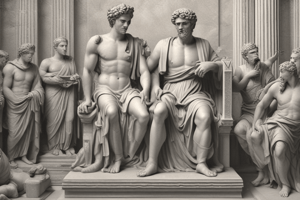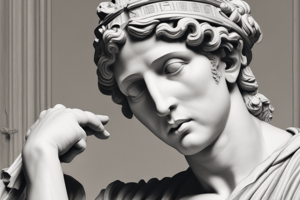Podcast
Questions and Answers
Who were the Romans most artistically influenced by?
Who were the Romans most artistically influenced by?
the Greeks
Why are Romans considered eclectic?
Why are Romans considered eclectic?
Roman art incorporates the styles of many cultures that it conquered.
It was more important for Roman artists to sign their work. Artists were celebrated and recognized in Roman society.
It was more important for Roman artists to sign their work. Artists were celebrated and recognized in Roman society.
False (B)
The Romans copied the Greek style of art except what?
The Romans copied the Greek style of art except what?
For the Romans, art served which purpose?
For the Romans, art served which purpose?
The Romans were more materialistic than the Greeks.
The Romans were more materialistic than the Greeks.
Greek artists were highly revered in their society and their names were known.
Greek artists were highly revered in their society and their names were known.
Mosaics were used where in the Roman house?
Mosaics were used where in the Roman house?
Roman art showed who?
Roman art showed who?
Roman art is categorized into two separate periods: the art of the Republic and the art of the Roman Empire.
Roman art is categorized into two separate periods: the art of the Republic and the art of the Roman Empire.
What building was built to exact proportions to make the viewer feel bigger?
What building was built to exact proportions to make the viewer feel bigger?
What is the Circus Maximus?
What is the Circus Maximus?
What is the reason why few bronze sculptures from ancient Greece exist today?
What is the reason why few bronze sculptures from ancient Greece exist today?
Name the three Greek column styles.
Name the three Greek column styles.
How did the early Greek artists portray women in their sculptures?
How did the early Greek artists portray women in their sculptures?
What were the Greeks known for?
What were the Greeks known for?
The Greeks were interested in perfecting an idealized human form in their artwork.
The Greeks were interested in perfecting an idealized human form in their artwork.
Which city was the center for Greek art?
Which city was the center for Greek art?
We have more examples of Greek Classical art than Hellenistic art.
We have more examples of Greek Classical art than Hellenistic art.
Name the uses for Greek sculpture.
Name the uses for Greek sculpture.
The Alexander Mosaic was preserved under ash from Mt. Vesuvius' eruption.
The Alexander Mosaic was preserved under ash from Mt. Vesuvius' eruption.
The Alexander Mosaic depicts a turning point in the war between the Greeks and the Persians.
The Alexander Mosaic depicts a turning point in the war between the Greeks and the Persians.
What gives the mosaic its sense of naturalism?
What gives the mosaic its sense of naturalism?
Flashcards are hidden until you start studying
Study Notes
Roman Art Influences
- Roman art was heavily influenced by Greek artistic styles.
- Romans are considered eclectic due to their incorporation of diverse cultural styles from conquered territories.
- Unlike Greek artists, Roman artists did not emphasize signing their works or seeking individual recognition.
Roman and Greek Sculptural Practices
- Romans predominantly copied Greek art styles but created unique variations, notably not replicating the Greek bust.
- Roman art served decorative purposes rather than ideological or commemorative themes.
- Roman society displayed a more materialistic approach compared to the Greeks.
Artistic Recognition
- Greek artists received high acclaim, with their names well-known in their society.
- Roman art featured representations of all ethnic groups within the Roman Empire.
Architectural Features
- Roman art is categorized into two periods: the art of the Republic and the art of the Roman Empire.
- The Pantheon was designed with proportions aimed at making viewers feel more significant.
- The Circus Maximus served as the venue for chariot races in ancient Rome.
Sculptures and Mosaics
- Few bronze sculptures from ancient Greece survive today due to loss or repurposing for new art or weapons.
- Mosaics were primarily used as decorative elements on floors and ceilings in Roman houses.
- The Alexander Mosaic, preserved under volcanic ash from Mt. Vesuvius, depicts a crucial moment in the conflict between Greeks and Persians.
Greek Art Characteristics
- Three main Greek column styles: Doric, Ionic, and Corinthian.
- Early Greek sculptures typically portrayed women fully clothed in draped garments.
- Greek art was notable for striving toward an idealized human form, reflective of their philosophical pursuits.
Artistic Legacies
- The majority of surviving examples stem from Greek Classical art as compared to Hellenistic works.
- Greek sculpture served various purposes, including grave monuments, decorative elements, propaganda, and dedications.
- Naturalism in art was achieved through techniques such as modeling and foreshortening, enhancing the depiction of subjects.
Studying That Suits You
Use AI to generate personalized quizzes and flashcards to suit your learning preferences.




